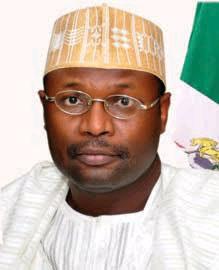


Yakubu: Two elections, two inconclusions

From Lokoja to Yenagoa, it is the same tale of inconclusion. The December 5 conduct of the governorship election in Bayelsa state was declared inconclusive by the Professor Mahmood Yakubu-led Independent National Electoral Commission, INEC.
Now, this followed a similar scenario that played out in Kogi where the November 21 governorship election was also declared inconclusive on the ground that elections could not be conducted in about 91 polling units. In the case of Bayelsa, elections could not be conducted successfully in Southern Ijaw Local Government Area of the state after two attempts.
It is not as though the declaration of elections as inconclusive might detract from the worth of the whole enterprise, it is just that it creates misperception among the voting public who would normally feel that the electoral body is up for a mischief. However, rather than announce results that would be highly-contentious, it is better to delay a little to get it right.
Nigerians do not seem to have a problem with that, but a season of inconclusions such as this, would readily give the impression that it is now a norm for the commission to go that way. If subsequent elections go the way of Kogi and Bayelsa, Nigerians would not be wrong to call to question, the competence of the chief electoral officer.
Growing partisanship
What could be responsible for the decisions that INEC took? Is it that politicians have now become too desperate that they would do all to see that elections are cancelled in some areas in order to create a scenario as we now have? Or, is it the incompetence of the new leadership of INEC that is gradually manifesting itself? And, could it also be because of the growing partisanship of security agencies, especially the military, who have been accused of doing the bidding of certain non-state actors particularly in the Bayelsa situation?
Then, there are pundits who have argued that Prof. Yakubu did not have enough time to prepare for the polls. However, if that is the case, it presupposes that the much-mouthed arrangement that Amina Zakari-the once upon a time acting chairperson of INEC- purportedly put in place was perhaps, a ruse.
INEC had often expressed its preparations for the two polls which started before the appointment of Prof. Yakubu? In effect, what the INEC boss was expected to do was to simply guide the process.
In any case, lack of sufficient time for preparation should not even be an excuse. Yakubu’s immediate predecessor, Prof. Attahiru Jega was appointed in June 2010 and he had a general election to conduct before May 2011. With just about 10 months, he re-invented the wheel because he had to superintend over an INEC that had become highly-bastardized, terribly-partisan and corruption-infested.
Although, the election time-table was at a time tinkered with as a result of logistic challenges, the 2011 general elections was adjudged one of the best in Nigeria’s electoral history.
Electoral history
The argument has often been made that Jega succeeded that much because as a unionist he was a member of the civil society movement and he is a political scientist.
However, as a thoroughbred academic and historian, Yakubu’s knowledge of Nigeria’s political history also comes handy as it should enable him pick the right lessons from the past while avoiding the pitfalls.
In one of his strategy-review meetings with security chiefs in Abuja, Yakubu said, “if 2015 was a litmus test of how far we have gone in our democratic journey, subsequent elections cannot fall below that bar”.
How he concludes the forthcoming supplementary poll in Bayelsa would show if we have gone below the bar and whether Nigerians can entrust him with the conduct of the 2019 general elections.
The INEC boss had also expressed his resolve not to reinvent the wheel as there were already structures on ground at the commission. “I inherited a system which I intend to strengthen and deepen. In 2011, we started what is known as the Inter-Agency Consultative Council on Election Security ICCES, and we are going to continue with that system to ensure adequate security for the polls”, he had stated.
Unfortunately, the less-than-professional role of security operatives in the Bayelsa election puts a dent on whatever measures the ICCES had put in place.
Going forward, INEC must try to assert its independence. The commission must play by its own rules and avoid kowtowing to the directives of security agencies who often-times, are card-carrying members of some political parties.
INEC must also evolve proactive measures to guard against situations that could force it to declare an election as inconclusive.
Inconclusive election
This is why it must strengthen its relationship with security agencies to mitigate or eliminate the activities of political thugs who often disrupt the process.
The commission must also strengthen its legal department, for it is a shame that out of over 800,000 electoral offenders in 2011, INEC could only prosecute 200. This only gives room for more electoral impunity.
Has Yakubu failed? Well, Nigerians should not be in a hurry to write his testimonial, but except he sits up, perhaps, the name, Inconclusive National Electoral Commission INEC might just stick.
Source: Vanguard
Share this post
Naijanetwork Forum Statistics
Threads: 14912,
Posts: 17975,
Members: 6718


